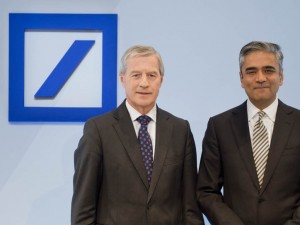
Leading banking institute, Deutsche Bank (DB) has reported positive earnings data in its 2014 Annual Report. The listed bank that offers retail and investment banking products and services saw an increase in net income. The bank reported a rise of 114% in its net income figures which reached $1.84 billion from $760 million, as reported a year earlier by the bank.
Apart from its performance figures, the bank was on track in its capital adequacy amounts with its CRR/CRD 4 pro forma (fully loaded) Common Equity Tier 1 ratio rising to 11.7%, as reported at the end of year 2014, showing an increase from 9.7% which was reported 12 months earlier.
Jürgen Fitschen and Anshu Jain, Co-Chief Executive Officers, commented in a statement: “In 2014, our profits improved despite challenging conditions. For the first time ever, all four of our core businesses delivered more than EUR 1 billion each in pre-tax profits. We further strengthened our capital base during the year. We have reduced total assets by nearly a quarter since June 2012, when the new management team took office, and continued to invest in systems, controls and governance. We reaffirmed our irreversible commitment to cultural change.”
The international banking sector has been on the radar as investor sentiment remains low on the back of the ongoing FX fixing and Libor manipulation cases. Several banks were faced with monetary penalties in November 2014 after authorities charged the lending institutions for their involvement in the Forex fixing cases.
Deutsche Bank has been relatively free from the hassles and uplifts of the FX probes unlike its competitors, with DB’s investigations leading to a senior trader departing from the bank. On the other hand, the bank was found guilty of its role in the Libor case, and was hit with a penalty from EU authorities in December 2013.
New Strategy

Jürgen Fitschen and Anshu Jain
In 2012, the firm made a number of changes at its board level, with the appointment of Jürgen Fitschen and Anshu Jain. Among the changes the banks deployed a new plan called “Strategy 2015+”, which has a number objectives, including the sound measurable techniques for earning, such as revenues and expenses and income figures for the bank’s various business divisions.
The two executives added: “Deutsche Bank today is a stronger, safer, better-balanced and more responsible institution than when we began this journey. We are aware the road ahead is challenging; we are now working diligently on the next phase of our strategy and look forward to sharing this with our stakeholders in the second quarter this year.”
Several banks were believed to be affected by the SNB crisis, with losses of over $100 million, in addition, the bank is believed to have reviewed its risk principles and made amendments to its FX prime brokerage division by increasing its collateral levels and reducing the leverage it offers on major instruments.













